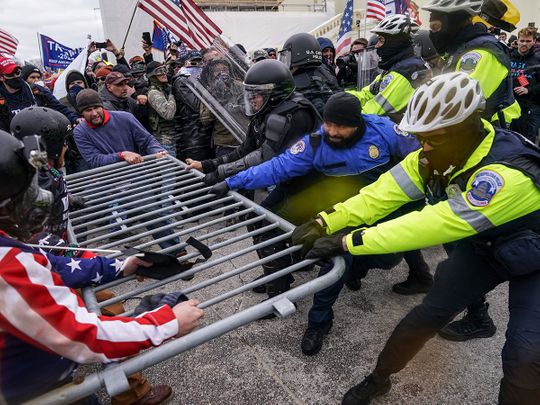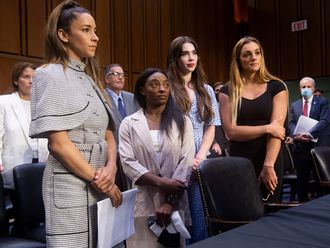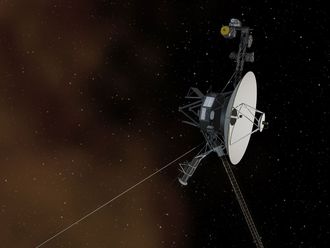
One year after thousands of Donald Trump supporters overran the U.S. Capitol while Congress was working to certify Joe Biden's election as president, the government is still pursuing charges over the attack.
So far more than 725 people have been charged with a variety of crimes stemming from the Jan. 6, 2021, insurrection, from breaking the Capitol's windows to assaulting police officers. Most have pleaded not guilty, setting up the potential for a swell of trials this year.
There's also the question of whether the former president or his closest allies will be criminally charged with inciting the riot. Meanwhile the nation's top Republican is fighting half a dozen civil suits for his own role in the events, and Trump insiders are challenging subpoenas from the House committee probing the roots of the assault.
No assurance of victory
Despite a vast array of evidence for the alleged crimes that largely played out on live television, there is no assurance of victory for those who have brought the cases, and few precedents for prosecuting or litigating a national insurrection. Cases with an unusual mix of charges"-including trespassing, interfering with law enforcement and damaging property with the intent to obstruct an official proceeding"-are up against defenses that portray the events as protected free speech.
"Prosecutors and plaintiffs have to make new law," Kimberly Wehle, a former federal prosecutor in Washington, said in an interview. "Anytime that happens, the argument is that the laws weren't designed for these purposes. But that's how law evolves."
In addition to free speech, the defenses of those criminally charged include arguments that they weren't in the Capitol illegally, because officers allowed them to enter. Trump, for his part, has denied any responsibility for the mob's acts, saying he urged activism, not violence.
False claim
While Trump and his allies in the Republican Party continue to falsely claim that the 2020 election was rigged, the debunked conspiracy theories won't fly in court, said Wehle, now a professor at the University of Baltimore School of Law.
"Unlike politicians, courts are bound by rules and evidence," and "the Big Lie will fail as a legal theory in post-insurrection litigation," Wehle said. She said the cases "may preserve our democracy, which is hanging on by a thread."
Democracy was Biden's theme in a speech he gave Thursday from the Capitol's Statuary Hall, which Trump supporters thronged last year in an effort to block the certification.
"I will defend this nation, and I will allow no one to place a dagger at the throat of democracy," Biden said, never mentioning Trump by name.
Trump is facing at least four civil lawsuits by more than a dozen police officers who say they suffered physical and emotional injuries in the riot, including eight who say they were injured by a mob that included white supremacists and "antidemocratic forces." The suits, including two filed just this week, allege that he is liable because he spent weeks spreading dangerous lies, convincing his supporters that American democracy would be destroyed if they didn't take action. The officers claim Trump then threw gasoline on the fire at a rally and later, as the mayhem played out on TV, allowed it to continue for hours before telling the mob to go home.
Trump argued in a Dec. 24 motion to dismiss one of the cases that he isn't "vicariously liable" for the riot and didn't have a "legally enforceable duty of care" to his political adversaries or others "who might find themselves in the path of impassioned supporters." A hearing on the motion could take place in the next few months. Arguments on a motion by Trump and his champion Rudy Giuliani to dismiss a suit by members of Congress over the riot are set for Monday.
• 165 have pleaded guilty.
• 31 sentenced to prison.
• Longest: 63 months.
The cases, criminal and civil, "will prove important in the coming year in convincing those willing to listen that the actions of Trump and his associates were nothing less than a coup attempt to keep Trump in power," said Jennifer Rodgers, a former federal prosecutor in Manhattan who lectures at Columbia Law School.
Of those criminally charged, about 165 have pleaded guilty, including about 70 who have been sentenced to jail, home detention or probation. Federal agents are still carrying out arrests after sifting through evidence, including tips from the public, GPS records from mobile phone companies, social media posts and video from security cameras.
One man indicted in December was accused of using a broken table leg with a protruding nail to assault police as he stormed the Capitol. And just this week agents detained Robert Snow, an Arkansas man accused of entering a restricted building and obstructing an official proceeding. As in many of the cases, the Justice Department said Snow admitted in interviews to being in the Capitol that day after being confronted with images of himself from closed-circuit television.
Length of jail term
Pleading guilty doesn't necessarily mean a short jail term. Robert Palmer, a Florida father of four, was sentenced in December to five years behind bars for assaulting law enforcement officers. Palmer got the stiffest sentence so far, even after seeking leniency by blaming his actions on Trump. Jacob Chansley, the "QAnon Shaman" who invaded the U.S. Senate chamber in a coyote-skin headdress, got more than three years in prison after admitting his guilt.
Former Olympic gold medal swimmer Klete Keller, once a teammate of Michael Phelps, pleaded guilty in September and is due for sentencing.
Attorney General Merrick Garland said in a speech Wednesday that "the actions we have taken thus far will not be our last."
"We resolve more straightforward cases first because they provide the evidentiary foundation for more complex cases," Garland told Justice Department staff. "Investigating the more overt crimes generates linkages to less overt ones. ... We follow the physical evidence. We follow the digital evidence. We follow the money."
Columbia's Rodgers thinks the government is in good shape. While some claims in the civil cases may eventually be dropped if they're not backed by evidence uncovered in the litigation, the Justice Department "has been careful" to charge the criminal cases "thoughtfully," she said.
Criminal cases
A criminal case against the leaders of the right-wing Proud Boys is already showing the limits of using Trump's exhortations as a defense. A federal judge in Washington on Dec. 28 denied the leaders' motion to dismiss the case, ruling they had been properly charged with conduct that isn't protected by the Constitution, including trespassing, destruction of property and interfering with police, all with the intent to obstruct Congress.
Similarly, a case against an alleged member of the ultra-right Three Percenter militia suggests the extent to which some true believers have latched on to conspiracy theories in their defense. Alan Hostetter, among the handful of rioters facing conspiracy charges, said in a December court filing that he was manipulated into participating in the riot by Yale secret society Skull and Bones and other groups he said were covertly acting for the government.
The Proud Boys have also been named, along with the Oath Keepers, in a civil suit filed by the Washington, D.C., government that could tie the groups up in court for years and drain them financially. D.C. Attorney General Karl Racine alleges they carefully coordinated the attack and left the local government to foot the bill for a massive police response and property damage.
More insights
Evidence in the case "will give us more insight into what fueled the violence, how this was all planned and unfolded, and give us a better understanding of how extremism is working in this country," said Joanna Lydgate, who leads the States United Democracy Center, which promotes free and fair elections and is working on the case. "When we watched the attack unfold on TV, it felt really chaotic and haphazard. But we've since learned that it was very organized, and I think it's going to be very hard for them to defend this case."
So far only former Trump adviser Steve Bannon has been charged with obstructing Congress by refusing to comply with a subpoena issued by the House committee. His trial is to start July 18, a schedule that could deprive the committee of evidence even if the U.S. wins the case. Bannon argued he needed more time to prepare a wide array of defenses, including that the grand jury that handed down the indictment was given bad instructions on the law and that the House committee is biased.
Such a case could also be brought against Trump's last chief of staff, Mark Meadows, after the House voted to hold him in criminal contempt for refusing to testify in the probe. It referred the matter to the Justice Department.
John Eastman, a conservative lawyer who advised Trump on ways to overturn the election, sued in December to block the release of his phone records to the committee. Conspiracy theorist Alex Jones filed a similar suit. Longtime Trump confidant Roger Stone invoked his Fifth Amendment right not to answer questions when he appeared before the panel.












